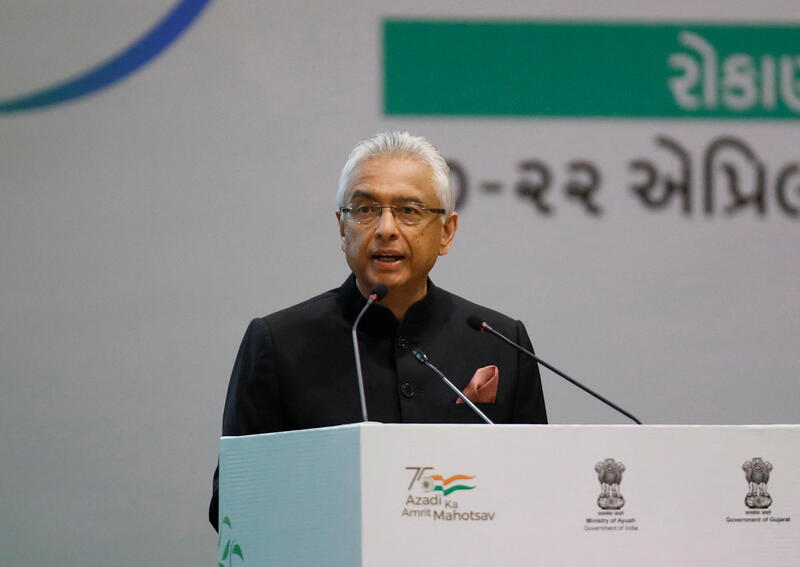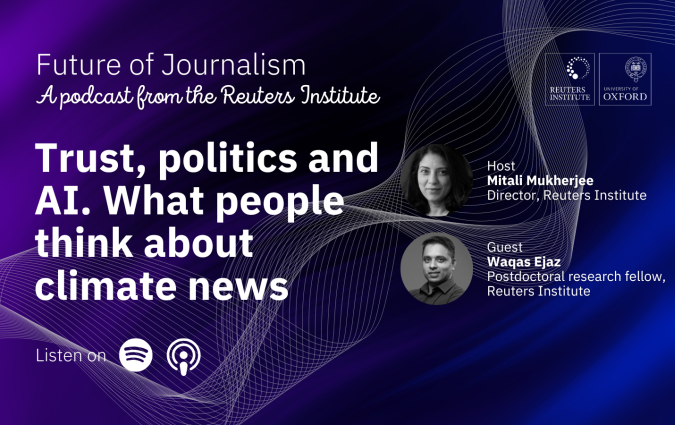When it comes to “green” finance, journalists must be willing to dig behind the jargon

Mauritius' Prime Minister Pravind Kumar Jugnauth speaks during the Global Ayush Investment and Innovation Summit 2022 in Gandhinagar, India. Credit: Amit Dave/Reuters
In January 2022, I was asked to write about green finance for the next issue of Le journal des Archipels, a business magazine in Mauritius, which I had joined two months earlier as a journalist. It was the first time we would be running a story on the topic.
It turned out to be a formative assignment. I quickly realised that while the term “green finance” is commonly used, almost no one really understands it—and so reporting on the topic called for a fundamental skill that all journalists rely on: asking seemingly obvious questions.
Being a journalist is also learning about humility. We don’t understand everything. We simply cannot and have to accept it. It’s hard for anyone to fully understand so many technical subjects across politics, business, law, sustainability, or finance, and this is especially true for green finance, a combination of both sustainability and finance.
I was a bit excited but also overwhelmed to take on the assignment—I could not recall an article on the subject from another local news outlet in Mauritius.
Although it’s a small country of about 2,000 square km in the Indian Ocean, Mauritius is an important African financial centre, managing assets 50 times the size of its own GDP. I had formed good relationships with the top executives of a big wealth management company, and one agreed to a chat. Thanks to the informal tone of our discussion, I could ask “silly questions” about what green finance is—which I quickly realised were not silly at all.
We both concluded that “green finance” lacks a proper definition—almost every finance expert has their own definitions they use internally. While some financial institutions prefer to talk about “green finance”, others prefer the terms “climate finance”, “sustainable finance” or the now in-famous “ESG” (environment, social and governance) frameworks.
Often, the terms are used interchangeably, while their definitions can conflict. Sustainability, as I’ve come to discover, is counterintuitive: debates on the ultimate sustainability of wind turbines, electric cars, nuclear energy, carbon sinks or even recycling are still ongoing.
As journalists, we should accept that we are not the ones who should be defining these terms for banks or investors. We are not supposed to be the experts and cannot be the ones defining green or sustainable finance for them. What we can and should tell our audience is that there is still a lack of clarity on these fundamental definitions. Simple as that.
My story highlighted that banks in Mauritius tended to prefer terms like “sustainable” finance: it allows the banks to use the term to cover products that are much broader than the reduction of emissions or the impact on climate or the environment. Robust “green” finance should show that there have been real reductions in carbon emissions or adaptation to climate change, one would think. But when investing in “sustainable” projects, anything that has a positive impact on the natural or social environment can be, and often is, labelled sustainable.
Luckily, as journalists, we have ways to get out of this tricky situation: referring to reality. For instance, at the time of my research, an important financial institution had just launched the first green bond on the island. This example allowed us to show that while there were still debates about what Green finance really is, there were initiatives that showed why it is relevant in the first place and what green finance entails.
On the other hand, there was a development aid agency from a European country which had for several years been offering a “green” line of credit, for adaptation to and mitigation of climate change. I wanted to understand their framework and see how they evaluated the real impact of these funds. Their responses to questions were full of gibberish and never really answered the questions: there was no data, no clear framework, and numerous empty words.
I decided not to publish the interview, for a simple reason: I believe that when you want to do a good job as a journalist, a big part is sorting out what to publish. Not everything is worth it. “Garbage in, garbage out,” I used to say: It’s my role and right to sort the wheat from the chaff, out of respect for my readers and for my job.
What has allowed me to write about Green finance has been the attitude I’ve had. It’s not only about finding the right sources and interviewees, but it has been firstly accepting that it’s a foggy subject. I’m a journalist, I ask questions and report about the answers I get, with the condition that the answers make sense to me. If they don’t, why would my report make sense to my readers? That is liberating.
And finally, as a business journalist, I truly believe that I should be as well-meaning as possible, be it to people or businesses. Then they will be eager to talk to me openly. I’m not a judge. But, it does not mean I should be complacent. Journalists describe what is, not what should be.






